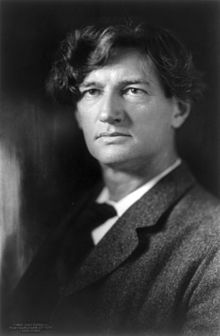Bliss Carman
| Bliss Carman | |
|---|---|

Photo by Pirie MacDonald
|
|
| Born | William Bliss Carman April 15, 1861 Fredericton, New Brunswick |
| Died | June 8, 1929 (aged 68) New Canaan, Connecticut |
| Resting place | Fredericton, New Brunswick |
| Occupation | poet |
| Language | English |
| Nationality | Canadian |
| Citizenship | British subject |
| Education | University of New Brunswick; University of Edinburgh; Harvard University |
| Genre | Poetry |
| Literary movement | Confederation Poets, The Song Fishermen |
| Notable works | Low Tide on Grand Pré, Songs from Vagabondia, Sappho: 100 Lyrics |
| Notable awards |
Lorne Pierce Medal (1928) Robert Frost Medal (1930) FRSC |
Bliss Carman FRSC (April 15, 1861 – June 8, 1929) was a Canadian poet who lived most of his life in the United States, where he achieved international fame. He was acclaimed as Canada's poet laureate during his later years.
In Canada, Carman is classed as one of the Confederation Poets, a group which also included Charles G.D. Roberts (his cousin), Archibald Lampman, and Duncan Campbell Scott. "Of the group, Carman had the surest lyric touch and achieved the widest international recognition. But unlike others, he never attempted to secure his income by novel writing, popular journalism, or non-literary employment. He remained a poet, supplementing his art with critical commentaries on literary ideas, philosophy, and aesthetics."
He was born William Bliss Carman in Fredericton, in the Maritime province of New Brunswick. "Bliss" was his mother's maiden name. He was the great grandson of United Empire Loyalists who fled to Nova Scotia after the American Revolution, settling in New Brunswick (then part of Nova Scotia). His literary roots run deep with an ancestry that includes a mother who was a descendant of Daniel Bliss of Concord, Massachusetts, the great-grandfather of Ralph Waldo Emerson. His sister, Jean, married the botanist and historian William Francis Ganong. And on his mother's side he was a first cousin to Charles (later Sir Charles) G. D. Roberts.
Carman was educated at the Fredericton Collegiate School and the University of New Brunswick (UNB), from which he received a B.A. in 1881. At the Collegiate School he came under the influence of headmaster George Robert Parkin, who gave him a love of classical literature and introduced him to the poetry of Dante Gabriel Rossetti and Algernon Charles Swinburne. His first published poem was in the UNB Monthly in 1879. He then spent a year at Oxford and the University of Edinburgh (1882–1883), but returned home to receive his M.A. from UNB in 1884.
...
Wikipedia
